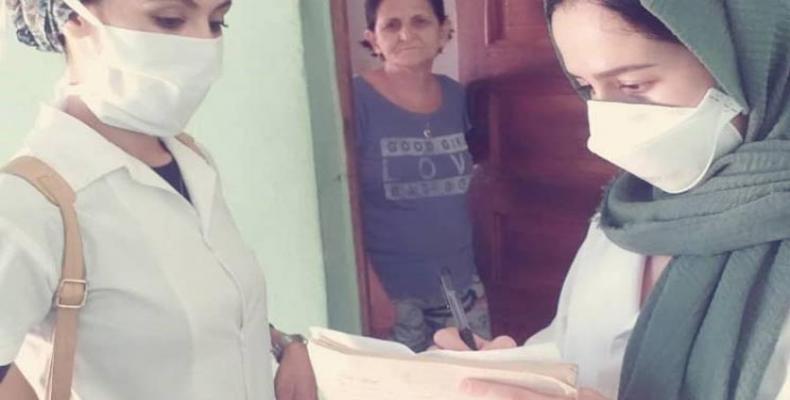United Nations, May 5 (RHC)-- The story of two Saharawis who study medicine in Cuba and contribute together with professionals from that island to stop the spread of COVID-19 is making headlines on the United Nations news website.
Guided by their professors, Umajutha and Maglaha, both Saharawi medical students, go from house to house inquiring about the state of health of the inhabitants and offering advice on the prevention of infection, related to hygiene and social isolation.
The UN website says they insist that this is their way of thanking the country which offered them the opportunity to study medicine.
Like many young Saharawis and others from other parts of the world, including some of other nationalities who are also refugees, Umajutha and Maglaha benefited from scholarships granted by Cuba to study medicine.
The UN news website says both students know and apply all health standards to protect themselves in their community work. Along with the veil or scarf with which Muslim women used to cover their heads, they now always wear the "nasobuco" or face-mask.
The UN news page also shows how hundreds of other medical and dentistry students on the island, Cuban and from many other backgrounds, voluntarily participate in active research work in the cities where they live and study.
These activities are carried out in search of residents who may present symptoms of COVID-19 or some epidemiological risk.
"For us, participating in the active research work is a way of doing our bit in these moments when so much is needed," Maglaha told the UN news site. "During this time in Cuba we have learned not only science, but also that the values of solidarity and humanism are essential for the exercise of our future profession."
Umajutha and Maglaha are both from Western Sahara, North Africa, and were born in a refugee camp in the Tindouf area of Algeria.
Western Sahara is one of the 17 Non-Self-Governing Territories under the supervision of the UN Special Committee on Decolonisation. The area is mostly occupied by Morocco, which the international community rejects.
In 1976, the Polisario Front proclaimed its independence and established the Sahrawi Arab Democratic Republic, which has been recognized by more than 80 states to date, including Cuba.
Morocco has insisted for years on an autonomy proposal for the territory as the only option to end the conflict. Meanwhile, the Polisario Front points to the need for a referendum that includes independence among the options.
Since 1976, Cuba has provided Western Sahara with support in health and education.


